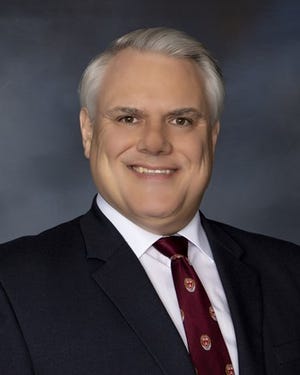Democrats square off in U.S. Senate race debate
BOZEMAN — The five candidates vying to be the Democratic nominee for Montana’s U.S. Senate seat squared off in Bozeman Friday night in a forum that showcased their diverse personalities and saw some attempt to articulate why voters should pick one person over the other, though incumbent U.S. Sen. Steve Daines still drew nearly all the criticism.
It was the first time sharing a stage for Bozeman resident Cora Neumann, who has worked in the public lands and public health fields; Helena Mayor Wilmot Collins; John Mues, a Navy veteran and engineer who works in the energy field and lives in Loma; scientist Mike Knoles, of Bozeman; and Josh Seckinger, a fly-fishing guide who also lives in Bozeman.
Neumann emphasized her experience working in the U.S. State Department and in the public health and public lands sectors, saying she was the candidate with the “energy, experience and infrastructure” to defeat Daines, who earlier this week got a primary challenger in the form of political newcomer and Stevensville hardware store owner Daniel Larson.
Neumann has outraised all the other candidates on the Democratic side of the race, pulling in $460,000 so far, compared to about $176,000 for Collins and $135,000 for Mues. Knoles trails significantly and Seckinger has not had to file a finance report yet.
Mues highlighted his resume in the Navy, as a schoolteacher and his family’s agricultural background, and also took the most direct dig at his fellow candidates Friday night, saying the other four people on the stage would “give Daines a free pass” and not help carry other Democrats on the ballot.
“Beating Sen. Daines is an existential obligation,” Mues said. “The stakes are too high.”
Collins hammered on Democratic talking points, from renewable energy to a higher minimum wage, sharing the story of coming to the United States as a refugee and eventually becoming the mayor of Helena. He also said Montanans had been shortchanged by having Daines as a senator. “I’m running for the US Senate because each state deserves two senators,” Collins quipped.
Knowles focused on a message of getting corruption and influence like money out of politics, saying that everything else Democrats want to accomplish would be met with roadblocks until those issues are resolved. He also said the solutions for many of the issues about which moderator Mike Wheat, a former state Supreme Court justice, prodded the candidates would be resolved with universal basic income.
Having just joined the race Tuesday, Seckinger seemed happy to be there, providing short answers that often came in under the minute allotted each candidate. He answered succinctly but didn’t get into much policy detail, saying he was a candidate who isn’t embarrassed to say, “I don’t know.” He presented himself as the average guy of the crowd, saying at one point, “I don’t think I’m an idiot, but I’m not a genius and you know I’m not the smartest person on the stage. And I will never pretend to be, but I feel like I have a message that resonates.” He added on Sunday he is kicking off a 56-county tour, saying “gas and a cheap motel” can sway Montana as much as big media buys.
When it came to how candidates want to address the high cost of accessing health care, Mues said Montana’s senator needed to recognize health care as a human right but live within the bounds of political constraints.
Neumann focused on what she said was the threat Daines posed to the Affordable Care Act, citing votes Republicans have taken to weaken parts of the law. She said she would back a public option to buy into Medicare.
Collins and Knoles said they’d listen to what constituents wanted.
There was some daylight between the candidates on whether to raise the federal minimum wage, with Neumann saying she would not want to see one set wage nationwide but a staggered approach taking into account different situations of each state.
Knowles said he’d rather see universal basic income, while Seckinger said he would support a minimum hourly wage of $15 with an increase for inflation every two years. Collins says he supported a $15 floor, too, and that he’s observed families in his job as a child support specialist struggle to make ends meet earning even that amount.
Mues also supports a $15 minimum, but wants to make sure there are subsidies to help offset the effects for small business in Montana.
The candidates also differed on how to address the expense associated with higher education. Seckinger told the crowd he dropped out of college before finishing because of the crippling debt he accumulated, and that he wants to see debt-free college.
Mues said a third of student debt should be relieved, another third should be taken on by the student and the final third relived via national service programs.
Presidential candidate and Massachusetts Sen. Elizabeth Warren’s plan to cancel up to $50,000 per student is the right approach for Collins, while Neumann said she wants to also see partial debt forgiveness, some debt lifted by national service and programs that give people incentives to go into in-demand careers by offering payback of their student loans.








